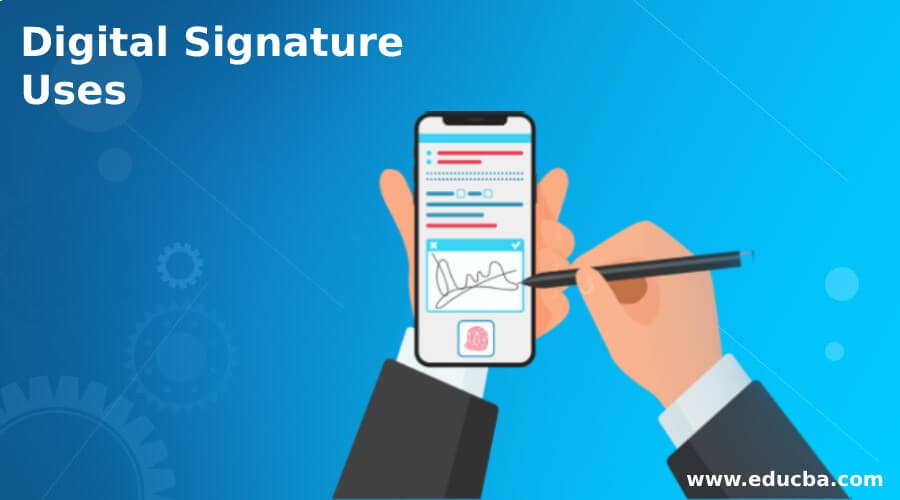Updated June 27, 2023

Introduction to Digital Signature
The following article provides an outline for Digital Signature Uses. A digital signature is an analytical technique used to verify the originality of digital documents and messages so that the integrity of documents can be verified and used without any further authentications. Two private and public keys are generated using a public key algorithm so that the private key is used to encrypt the document or signature, and the public key is used to decrypt the same document. If there is any problem with decryption, it shows that the document has some problem with its signature or its authenticity is hampered by someone.
List of Digital Signature Uses
Given below is the list of digital signature uses:
1. Signature Authentication
As anyone would say, the most common use is to check the authenticity of signatures for important documents or cheques. Though we have passwords and emails nowadays, when it is necessary to use a document, it is also essential to check the authenticity of the same. Digital signature comes to the rescue here as if any necessary documents are to be verified, it can be used to generate public and private keys to verify the document. We can verify Personal Identification Numbers (PINs) using digital signatures to verify the documents and mail them for further use. Codes and passwords also can be verified with this method.
2. Cryptographic Algorithms
Digital signatures are very much helpful in cryptographic algorithms. For example, we have symmetric and asymmetric encryptions where one key is used for encryption and decryption in symmetric encryptions. In asymmetric encryption, people use the public key for encryption and the private key for decryption. Anyone can encrypt the messages using the public key, but only the intended receiver or sender can decrypt them using the private key. This helps withhold the messages from others and decrypt the same only for the person concerned. Also, a digital signature helps find the origin of the message with the help of key encryption.
3. Certificate Verification
With the onset of technology, creating fake certificates has become easy, making it tougher to find authenticity. Using these fake certificates to obtain jobs or admissions in reputed colleges deprives prospective candidates of opportunities. Digital signature comes to help here as Certification Authority gives digital signature encryption to candidates to verify fake certificates easily.
4. Data Validation
Data exchange and analysis are happening a lot nowadays, and a small change in data makes the entire share crumple down or build up. Digital signatures provide code to check the validity and authenticity of raw data before processing to verify and process any data. This helps in further analysis of data without any scope of confusion.
5. Service Provider Validation
A person or a company provides validation of signatures, documents, and certificates with the help of digital signatures. They are called Trusted person validation, which helps validate the documents on behalf of the provided company and gives assurance of the same. They provide reports based on the documents they have validated, which will be helpful for companies with a huge number of documents for validation.
6. Digital Market
Nowadays, the digital market is of great scope for buyers and sellers. People can buy and sell the goods online. But it is necessary to know the authenticity of the traders before making trades with any of them. There is Public Key Infrastructure that generates vendor keys so that traders can be trusted. This PKI, which helps trade in the international market, is recognized worldwide. If vendors encounter any issues, they can use PKI, which is legally accepted and helps identify any trade-related culprits.
7. Time Authentication and Validation
We know that share markets depend a lot on time, and if there is a small change in the date in the documents provided by the companies, shareholders will buy or sell the same stock. This results in huge profits for some companies and losses for others. To rectify this, a digital signature helps validate time so that the news reports can be validated for their date. This also helps in lottery tickets and legal issuances where date and time are crucial.
8. Time and Cost Savings
Companies can save time by making people sign the document offline, storing it for the future, and reusing it whenever needed. If we store the same online, it is just the signature, and whenever we need it, it can be retrieved from the servers and used. Additionally, individuals can save money by using lockers and ensuring proper maintenance for storing crucial documents. This makes the company assign someone to look after the same and be in trust with the same person. Digital signatures help avoid all these by storing them in servers and providing a dynamic folder key.
9. Tracing the Documents
If we sign a document offline and pass it on to someone physically, it won’t be easy to trace the origin of the document. If something hampers it at some point, traceability will be difficult. Digital signatures are helpful here as they can trace the document’s origin and the transfer of documents from one system to another.
10. Environment
Environmentalists will be happy with digital signatures as using paper can be reduced by using digital signatures everywhere. We can encrypt the documents and store them online, making users minimize paper. We need not transport paper documents which reduces the cost of transportation and the resulting security issues.
Conclusion
It’s time to stay away from unsecured practices and make all documents secure with the help of encryption. Technology helps us to do the same, where we can enjoy all the benefits of technology to the fullest. We should know the limitless opportunities of technology in various forms.
Recommended Articles
We hope that this EDUCBA information on “Digital Signature Uses” was beneficial to you. You can view EDUCBA’s recommended articles for more information.

